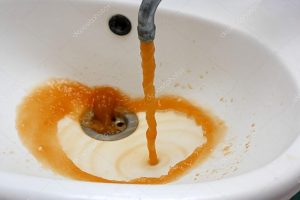Common Plumbing Problems: Rusty Water
In today’s world with all of our advancements in science and modern technology, we generally expect to turn on our taps at home and see clean water. However, sometimes you may turn on your taps and see rusty water running! Sometimes, rusty water may occur if your local water authority is doing work on the pipes or has some kind of leak or burst pipe. However, depending on the age of your home’s plumbing system, the rust could be coming from right inside your own plumbing system. Before panicking and calling a plumber, here are some things you can look for.

- Is it definitely rust? You don’t have to be a scientist or a plumber to figure out if its definitely rust in your water. Rusty water should have a metallic odor and be reddish brown in color.
- Where is the rust coming from? Its important to try and determine where the rust is coming from. Sometimes, you may get a notice from your local water authority that there is rust in the water and they’re working on a solution. However, if none of your neighbors seem to have the same problem, it could be coming from inside your home. Here’s an easy way to check- Fill a glass with cold water. Check the water in the glass for a metallic odor or a rusty coloring. Let the cold water run for a few seconds and check with another glass. Then, run the hot water and check it in another glass. If the rusty water appears in the hot water or if it goes away after a few seconds, the rust may be coming from your home. If the rust appears continuously, you should call your local water authority. If the rust only appeared in the cold water, the rust could potentially be coming from the pipes in your home. If it appeared in the hot water, it could be coming from your hot water heater.
- What next? Whether its your pipes or your hot water heater, it must be replaced! You simply can’t repair a rusty pipe or a rusty hot water heater. Rust and corrosion will simply get worse and worse if the problem pipes or hot water heater aren’t replaced. If you replace your hot water heater, replacing the anode rod every few years on your new hot water heater can potentially prevent the issue in the future and greatly extend the life of your new water heater.
For help finding the source of rust in your home’s water or for help replacing rusty pipes or a rusty hot water heater, call the professionals at Masterflo Plumbing today at (678) 822-7095!

No comment yet, add your voice below!